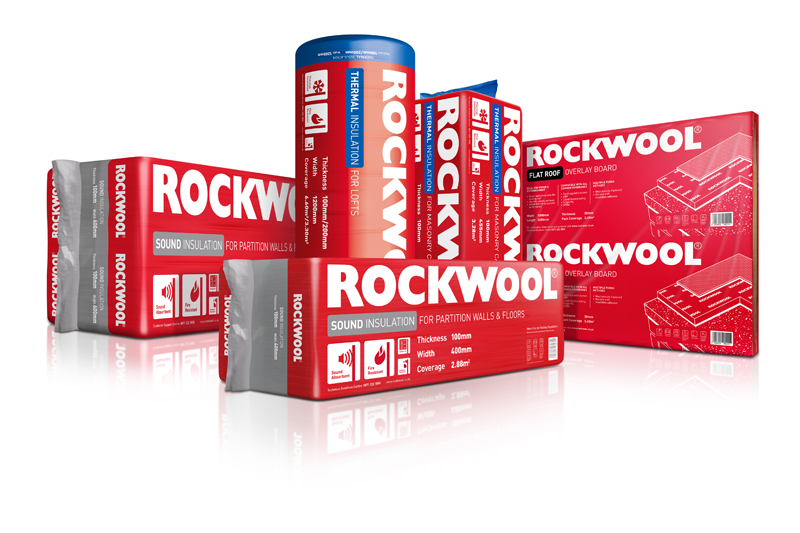
Mark Bungay, National Sales Manager DIY & Merchants at Rockwool, examines the benefits of renovating existing homes and how to reduce energy consumption with better insulation.
Move or improve? It’s a question many people are currently asking themselves, and it’s a decision that can be influenced by many factors, including; additional space, cost to move, the possible increase in value of the residence from renovation and improved energy saving.
Market growth
The trend for improve rather than move has seen staggering growth in recent years. According to Hiscox Renovations and Extensions report, the number of homeowners choosing to improve their home rather than move has risen five-fold since 2013. Given the housing market shortage and general market uncertainty, it seems the trend will continue, with up to 4million UK homes planning some form of renovation this year.
So, what’s behind the trend? Well, many renovation projects have a strong focus on energy saving and offer the opportunity for more sustainable living (a trend championed by Millennials). According to the ‘Putting Renovation on the Agenda’ Rockwool report, more than 28% of greenhouse gas emissions derive from energy use in buildings, and if nothing is done about it, that number could increase to 50% (Source: UN and IEA, 2017).
Even more important is an awareness of how the quality of a building can contribute significantly to our wellbeing — and with sustainability, comfort and safety high on everyone’s agenda, selecting the right materials has never been so important.
Quieter living environment
Poor acoustics impact hugely on the overall environment of our homes, compromising our attention spans, raising stress levels and adversely affecting lifestyles and our wellbeing. Without proper sound insulation, noise will travel easily, either directly through the separating wall or floor, or through an indirect or flanking route.
Even in newer homes, people are much more aware than they used to be of louder TV, music levels, voices and footsteps on wooden floors from neighbours, or from rooms above. It’s this heightened sensitivity that will persuade them to take the steps to do something about it as a key component of any home improvement.
Factoring in noise from the outset of a project can be the most cost-effective route to ensuring a high standard of acoustic performance and can be as simple as selecting an insulation material that delivers on both thermal needs and sounds absorption.
Made from stone, with a dense, non-directional fibre structure, Rockwool Sound Insulation is ideally suited to the challenge of cutting noise pollution in the home environment. Thanks to its properties, Rockwool Sound Insulation, when fitted inside cavity walls or between floors, actually absorbs sound energy as it travels towards the occupant. It effectively traps sound waves and dampens vibration to provide an enhanced noise reducing solution for internal and separating walls as well as floors in applications including home offices, studies, bedrooms, bathrooms and TV, media and gaming rooms.
Safer living environment
The growing public awareness and education in fire safety, particularly what is and is not a combustible material, inevitably will result in homeowners driving demand for the use of non-combustible insulation on their homes.
Rockwool stone wool insulation tolerates temperatures of up to 1000°C and has been awarded the highest possible European classification: A1 non-combustible. Ideal for safety conscious consumers, Rockwool provides the protection that these home owners are looking for and the means for suppliers to meet their demands.
Meeting the challenge
Insulation can be seen as technically complex, but Rockwool has a range of tools and support on offer to help merchants to better understand product distinctions, benefits and application benefits. The company is enhancing its packaging to ensure it is shelf ready and easy for customers to understand and purchase the right insulation for the project.
Furthermore, there is a dedicated team on hand to provide guidance, advice, in branch demonstrations and staff training. The #TheSoundExperience Rockwool Demo Truck is also visiting merchant branches across the country to provide a better understanding of the strength of stone wool’s acoustic, thermal and fire performance.
Knowledge is key for merchants as we are seeing builders and consumers are become more aware of the different types and applications of insulation in the home and how a product performs, especially in the context of noise reduction, thermal performance and, importantly, fire safety.
Whether it be a warmer home (better thermal performance) a quieter home (blocking out urban noise) or a safer home (replacing combustible materials) Rockwool insulation is the sustainable choice for you and your customers made from Stone, that is abundant and sustainably sourced. We are confident that merchants who stock the Rockwool sound and thermal insulation range are going to be in a good place to benefit from the growth in renovation projects.
For more information on Rockwool’s range of products and support services for merchants, visit www.rockwool.co.uk.









